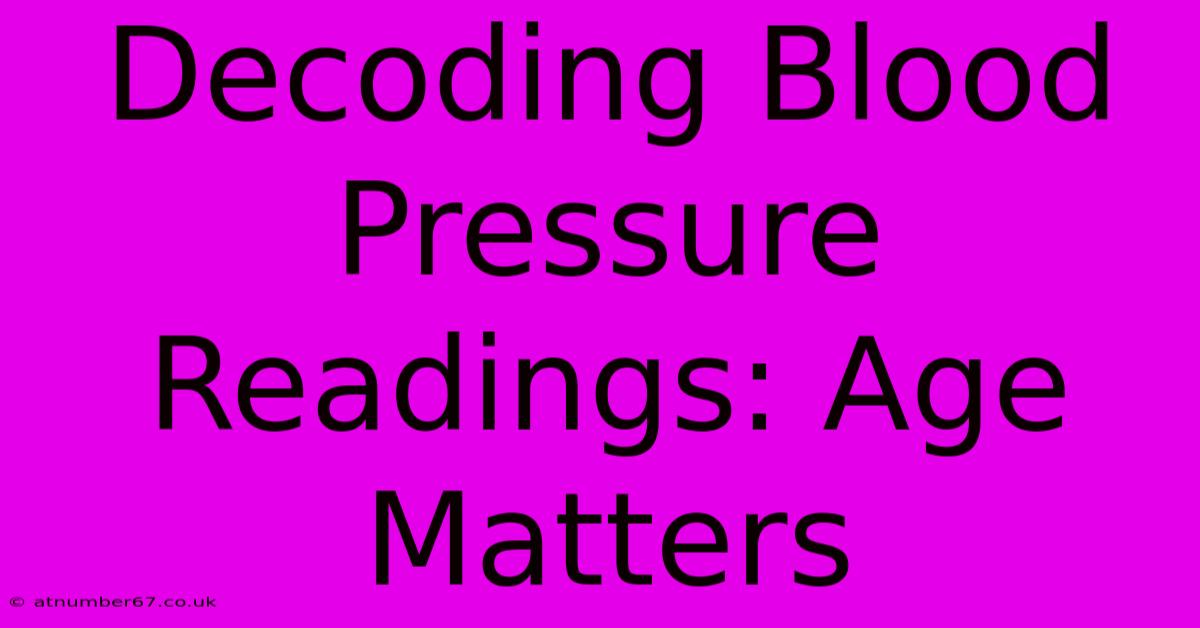Decoding Blood Pressure Readings: Age Matters

Table of Contents
Decoding Blood Pressure Readings: Age Matters
Understanding your blood pressure is crucial for maintaining good health, but interpreting those numbers isn't always straightforward. One significant factor often overlooked is age. Blood pressure naturally changes throughout life, and what's considered normal for a 20-year-old differs significantly from what's normal for a 70-year-old. This article will decode blood pressure readings, emphasizing how age influences interpretation and management.
Understanding Blood Pressure Numbers
Before we delve into age-specific considerations, let's refresh our understanding of blood pressure readings. Your blood pressure is expressed as two numbers:
- Systolic Pressure (Top Number): This measures the pressure in your arteries when your heart beats.
- Diastolic Pressure (Bottom Number): This measures the pressure in your arteries when your heart rests between beats.
Both numbers are equally important in assessing your cardiovascular health. They are typically measured in millimeters of mercury (mmHg).
Blood Pressure Categories Across the Lifespan
The American Heart Association (AHA) and other health organizations provide guidelines for classifying blood pressure, but these categories need to be interpreted with age in mind. Here's a general overview:
Note: These are general guidelines. Individual needs vary, and your doctor will consider your overall health, family history, and other factors when assessing your blood pressure.
Children and Adolescents (under 18)
Blood pressure norms for children and adolescents are different than adults and are based on age, sex, and height. Consistent high blood pressure in this age group requires immediate medical attention as it can indicate underlying health issues.
Adults (18-64)
- Normal: Less than 120/80 mmHg
- Elevated: 120-129/less than 80 mmHg
- Stage 1 Hypertension: 130-139/80-89 mmHg
- Stage 2 Hypertension: 140/90 mmHg or higher
- Hypertensive Crisis: Higher than 180/120 mmHg (requires immediate medical attention)
Older Adults (65+)
Blood pressure guidelines for older adults are slightly different. While aiming for less than 120/80 mmHg is still ideal, a slightly higher reading might be acceptable depending on individual health status and other risk factors. The risk of falls and other complications associated with lower blood pressure must be carefully weighed against the risks of higher blood pressure. Consult your doctor for personalized guidance.
Why Age Matters in Blood Pressure Management
Several physiological changes associated with aging influence blood pressure:
- Arterial Stiffening: As we age, our arteries become less flexible, leading to increased blood pressure.
- Reduced Kidney Function: The kidneys play a crucial role in regulating blood pressure, and their function often declines with age.
- Increased Prevalence of Underlying Conditions: Age increases the likelihood of developing conditions like diabetes and heart disease, which can contribute to high blood pressure.
What You Can Do
Regardless of your age, maintaining a healthy lifestyle is crucial for managing blood pressure:
- Healthy Diet: Focus on fruits, vegetables, whole grains, and lean proteins. Limit sodium intake.
- Regular Exercise: Aim for at least 150 minutes of moderate-intensity aerobic activity per week.
- Weight Management: Maintaining a healthy weight can significantly impact blood pressure.
- Stress Reduction: Chronic stress can elevate blood pressure. Practice stress-reducing techniques like yoga, meditation, or deep breathing.
- Limit Alcohol Consumption: Excessive alcohol intake can raise blood pressure.
- Quit Smoking: Smoking damages blood vessels and increases blood pressure.
When to See a Doctor
Regular blood pressure checks are crucial at any age. If your blood pressure readings are consistently high, or if you experience symptoms like headaches, dizziness, or shortness of breath, consult your doctor immediately. Early detection and management are key to preventing serious complications.
Disclaimer: This article is for informational purposes only and does not constitute medical advice. Always consult with your physician or other qualified healthcare provider for any questions you may have regarding a medical condition. The information provided herein should not be used during any medical emergency or for the diagnosis or treatment of any medical condition.
This article incorporates several on-page SEO strategies, including keyword optimization ("blood pressure readings," "age matters," "blood pressure management," "high blood pressure"), use of header tags (H2, H3) for structure, and a clear, concise writing style to improve readability and user engagement. Off-page SEO would involve promoting this article through social media, guest blogging, and other content marketing strategies.

Thank you for visiting our website wich cover about Decoding Blood Pressure Readings: Age Matters. We hope the information provided has been useful to you. Feel free to contact us if you have any questions or need further assistance. See you next time and dont miss to bookmark.
Featured Posts
-
Finally Hair Thats Strong And Stunning Carols Daughter
Apr 04, 2025
-
Unique Birthday Wishes For Your Strong And Independent Daughter
Apr 04, 2025
-
Dele Momodu His Net Worth And Philanthropic Works
Apr 04, 2025
-
Son Ekstreden Kalan Borc Achieve Financial Stability
Apr 04, 2025
-
Ruth Elliss Daughter A Daughters Testimony
Apr 04, 2025
